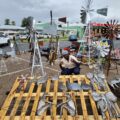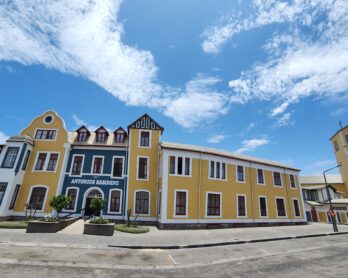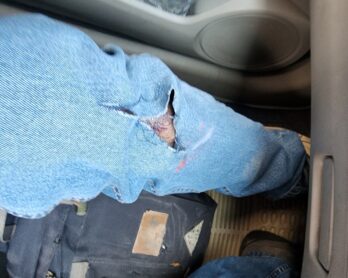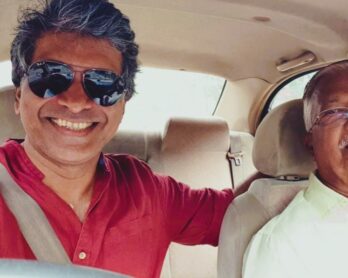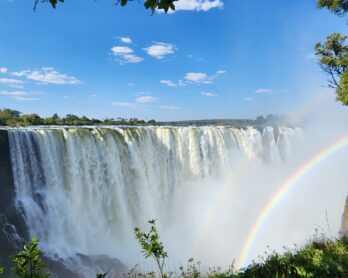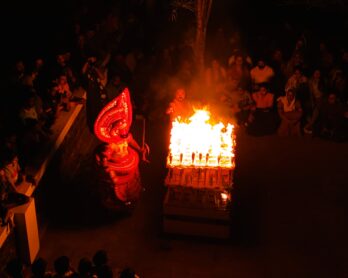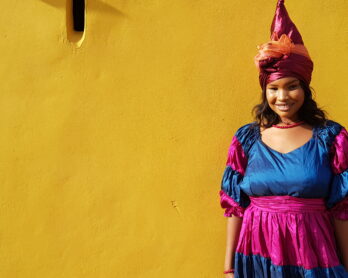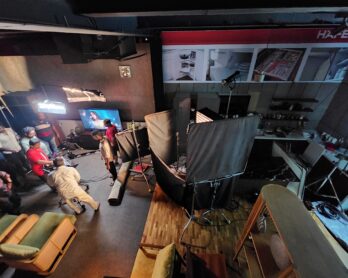There was more to it, and she was trying to get it talked out. After a time, she quit trying. Why don’t you dance?, Raymond Carver.
For most part of the wedding ceremony, the bride was missing from the altar. She was puking her guts out because of all the spice she ate. She was also six months pregnant.
“My mother told everyone it was gas from eating too much spice,” Jimmy told me with a straight face. I looked at him sideways but did not detect any mirth. It was matter-of-fact.
“Ruth is usually quite crunk about curries when we eat out in Atlanta. But here, it was the real deal.” Like most landed people of Pala, his folks too grew their own pepper and chillies organically which jacked up potency.
“The gas was also touted as the reason for her bloated tummy.” This time he looked at me and smiled.
We were walking along the riparian bypass, newly constructed to ease traffic along the main drag. Rubber trees glistened with rain-washed leaves on both sides of the elevated track and further on the Meenachil River flowed and shimmered. The river made the land immensely fertile which attracted the early farmer-settlers. Our folks were teachers, but their forefathers ploughed the land and grew spices, tuber crops and rubber. Most of which were being cleared to make way for villa and apartment projects now; the cold siren of motorised tree-cutters rending the air had become part of daily living.
Jimmy and I reached the sloping junction marked by a weary cop watching from a distance. To the right was Ramapuram and left the centre of town. This was marked by a long-steepled church; my tharavadu, ancestral home, was right next door where I was born and spent the first five years of my life before moving to Nigeria. A complex of commerce now. A little ahead was the tuition centre where we were both once enrolled to brush up on Hindi and Mathematics. The building that housed it was marked to be razed soon to facilitate the widening of the bypass. The extra classes didn’t exactly make us better, but our charm and shenanigans won us many admirers; him more than me for he was too good looking.
He would go on to earn a degree in hotel management – much to the dismay of his conservative parents – and become a kitchen staff in a cruise liner where he met Ruth, who was on a holiday in between jobs. Though I couldn’t make it to his wedding, I went soon after to his home to congratulate and open a bottle of Teachers. Ruth didn’t drink – in part because she was pregnant and a staunch Protestant from Atlanta.
“You know how it is for a Protestant to see saints in every room – one slaying and another doing magic.” Jimmy had told me later that evening while we sat drinking the whiskey on his terrace.
“And Via Sacra in the living room,” I added. When his parents began the daily rosary, Ruth came up and joined us with a plate of papaya.
“This,” she said looking at the boat-shaped slices with real affection, “has been my life-saver since I came here.”
“Tomorrow I will get somebody to pick fresh guava and rambutan,” Jimmy said stroking her shoulder. “I will buy some bananas too if you want – till the homegrown ones ripen.”
“Don’t buy anything,” Ruth replied. “I can really do with a break from all the Frankenfood we have at home.”
Autorickshaw drivers waiting for fare from the Civil Station looked at us with disinterest. As did some shopkeepers selling mobile phone cards and accessories. Every second shop sold lottery tickets; the demand for luck must be connected to being the biggest drinkers in the country. Or having the highest suicide rate. It was something which came up when the Teachers was getting over. Jimmy said it was all about expectation. The state itself was a pressure cooker. Why he chose to settle down in Atlanta and not Pala. Jimmy was an only son. With that, as well as so much asset which would accrue to him, he would have been under tremendous pressure had he stayed back.
Soon after the junction was a rubber shop to our left. It was an empty concrete shell, awaiting the same fate as the tuition centre. A week-long invocation some time ago by a congregation in nearby Kottayam hadn’t succeeded in attracting intervention of any sort – rubber exports weren’t curbed nor were domestic prices raised. Over the years the slide continued and now it had hit rock bottom. At least a million families in the state lived directly off rubber and more than that earned a useful income. It was handy pocket money when we were boys: we would steal rubber sheets from home, wrapping them around our bodies and sell it at this shop on our way to class. Flushed, we’d sometimes head to a toddy shop, affordable local brew. Their access had come in the way of their functioning as per a recent court ruling. Most of them had shut down.
We crested the Lalam Hill and came down at the new private bus stand from where we turned back towards town. A drama office on our left across the road from the Bishop’s House. After Sunday school, we would sometimes come here to watch play rehearsals; movie stars lived in other planets, this was the closest we could touch stardom. All the actors wore floral-print shirts and smoked beedis like Mammootty or walked with an affected hunch aping Mohanlal. Afterwards we would buy a packet of beedi and smoke it through clenched teeth acting lecherous or villainous. But it was tough convincing the tailor to stitch the hem with Leela lace.
The town itself hadn’t changed much – just an extended levee along the riverbank were an additional road was built. The buildings were the same little ones only painted over during the annual Jubilee celebrations. If earlier I couldn’t walk for more than a few minutes before some acquaintance came up and talked, now I could crisscross the whole town without attention. Nobody knew anybody now. Even among friends from the past the only ones excited to see me were the insurance sellers and realtors. No one cared either, a palpable desperation stuck in the air like gossamer.
Ruth was waiting for us at the old municipal complex, in an old studio where their wedding photos were being readied. Jimmy’s father dropped her in the car and returned home as there was no parking space – torrential monsoons had sent the riprap tumbling along the side facing the river where the original car park was.
“Woot, woot,” she said seeing us. “I am glad you are here. Can you please tell them that I need the photographs without the Taj Mahal cut out as backdrop?”
Ruth walked with us to the last point – the bus stop where we met our lovers pretending to wait for the bus. Eyes locked, fingers touching, we would part ways with a heavy heart – till next Wednesday or Friday or Sunday depending on whether she was from tuition class or Sunday school.
“Why are you taking pictures of this shanty?” She asked me. I told her about the girls.
“Ah,” she said, “memories of La-la land.”








